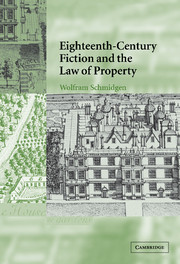Book contents
- Frontmatter
- Contents
- Acknowledgments
- Introduction
- 1 Communal form and the transitional culture of the eighteenth-century novel
- 2 Terra nullius, cannibalism, and the natural law of appropriation in Robinson Crusoe
- 3 Henry Fielding and the common law of plenitude
- 4 Commodity fetishism in heterogeneous spaces
- 5 Ann Radcliffe and the political economy of Gothic space
- 6 Scottish law and Waverley's museum of property
- Conclusion
- Notes
- Bibliography
- Index
4 - Commodity fetishism in heterogeneous spaces
Published online by Cambridge University Press: 22 September 2009
- Frontmatter
- Contents
- Acknowledgments
- Introduction
- 1 Communal form and the transitional culture of the eighteenth-century novel
- 2 Terra nullius, cannibalism, and the natural law of appropriation in Robinson Crusoe
- 3 Henry Fielding and the common law of plenitude
- 4 Commodity fetishism in heterogeneous spaces
- 5 Ann Radcliffe and the political economy of Gothic space
- 6 Scottish law and Waverley's museum of property
- Conclusion
- Notes
- Bibliography
- Index
Summary
My discussion so far has, I trust, begun to indicate the extent to which novels as different as Robinson Crusoe and Tom Jones depend on an intermixture of persons and things in their construction of community. The violent instability of boundaries in Defoe's novel and their invisibility in Fielding's show that the communal forms these texts figure by drawing on natural and common law meet their limit in an entanglement between persons and things. True, Robinson Crusoe strives to create a causal relationship between narrative and description (thereby placing the material under human control), and Tom Jones seeks a relationship of equivalence (thereby stressing the unity of human and material spheres). But these different strategies nonetheless reveal that essential – though ideologically opposed – cultural resources of the first half of the eighteenth century do not lend themselves to assembling more differentiated communities of persons and things. Considering Robinson Crusoe's difficulties in stabilizing boundaries and the depth with which Fielding imagines a possessive world of preestablished and natural-seeming continuities, one is, in fact, inclined to say that even at mid-century, British legal and political ways were still more susceptible to literary appropriations that integrated time, space, and practice than to ones that pulled apart this trinity. The Gestalt of the manor outlined by Edward Coke a hundred years earlier still provides the most helpful map in locating the limits of the communal in early eighteenth-century British fiction.
- Type
- Chapter
- Information
- Eighteenth-Century Fiction and the Law of Property , pp. 104 - 149Publisher: Cambridge University PressPrint publication year: 2002

